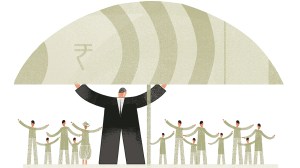On the slippery slope
Sonia Gandhi's uncontested assumption of the position of chairperson of the Congress Parliamentary Party 48 hours after becoming party presi...

Sonia Gandhi’s uncontested assumption of the position of chairperson of the Congress Parliamentary Party 48 hours after becoming party president is a worrying development. No midnight amendments of the party constitution alter the fact that there is no precedent in the 113-year history of the party for such a coup.
With nothing but a month-long election campaign in between, Sonia has leapt in two years from primary membership to the top posts. She has scarcely got her feet wet before taking on the huge responsibility of reforming a decrepit organisation and directing its political and legislative strategies. Even the heirs of family firms are put through the mill in the interests of the business. So, there are bound to be many questions over the ensuing months about why so much power has been concentrated in one pair of inexperienced hands. Rajiv Gandhi, whose rapid elevation comes closest to Sonia’s, did serve a short period of formal apprenticeship under his mother.
But he was ill-prepared for the taskshe undertook. To the cheers of Congress workers, he railed against power-brokers and surrounded himself with fresh new faces. The former thrived and it was not long before the latter abandoned the party or went into brokering on their own account.Arun Singh, the sanyasi in the hills, is a silent reminder of the slippery slope that lies before all those to whom sycophantic Congressmen give absolute power. Certainly Sonia Gandhi must bear some responsibilities since the party is convinced it needs her name. She may be the unifying symbol for party workers today but should make no mistake about the difference between symbols and the reality. Sycophancy comes easily to Congressmen and is not to be confused with loyalty. Beneath the voices in unison asking her to become supreme boss is dissension between Congress leaders to resolve which, in classic form, they surrender authority to her. This is where the temptation begins. As party chief and CPP leader Indira Gandhi exercised her authority to bring factionalleaders to order and unite the party. But pretty soon maintaining party unity by central diktat became an excuse for keeping challengers at bay. Divide and rule was her method to retain total control of the party. The decline of the Congress is the direct consequence of her authoritarian methods.
It is early days yet, but the first signs under the new dispensation are discouraging. When politicians defeated in the polls like Oscar Fernandes and Santosh Mohan Dev are given tickets to the Rajya Sabha on the morning after, the message is that the rewards go to those who make themselves useful to the party chief. What the people say is irrelevant. The same is true of the six-member political advisory group in which only two have earned their places there the hard way by successful grassroots work and the rest by grace of Madam Gandhi. It is not going to be easy for the Congress to build a democratic organisation and collective leadership on the ruins of a monarchical party. But it should be obvious to all thatthe Congress is asking for trouble by going back to its old ways.
Photos





- 01
- 02
- 03
- 04
- 05


























